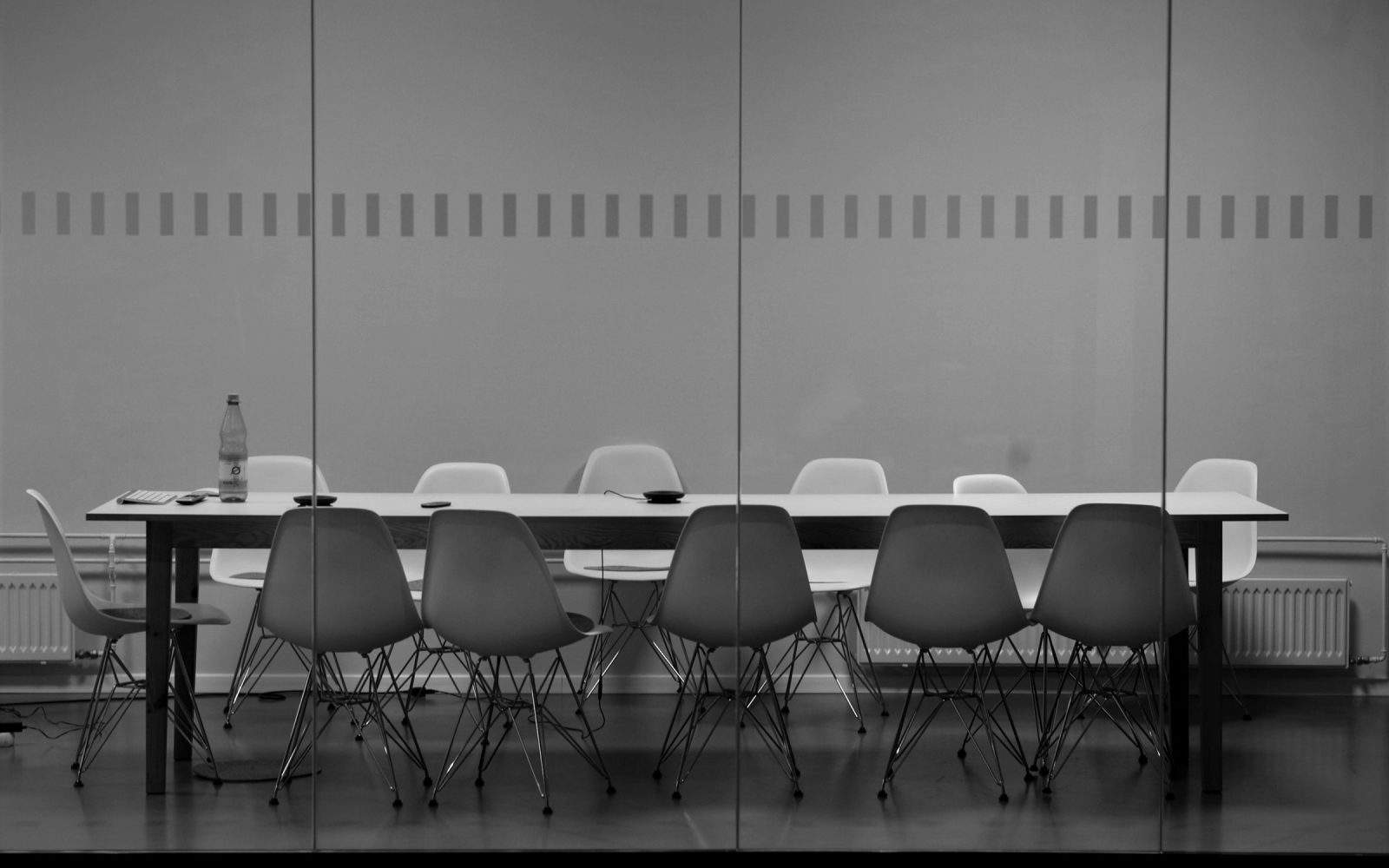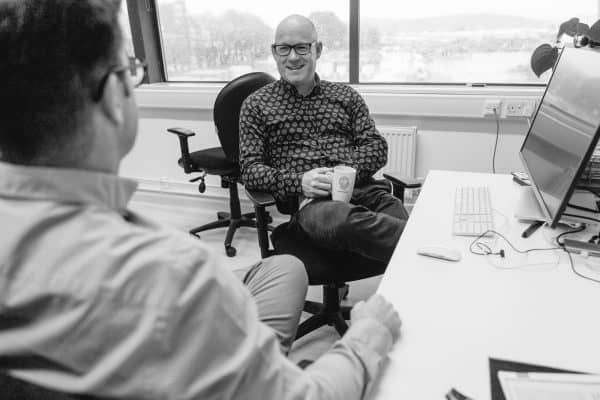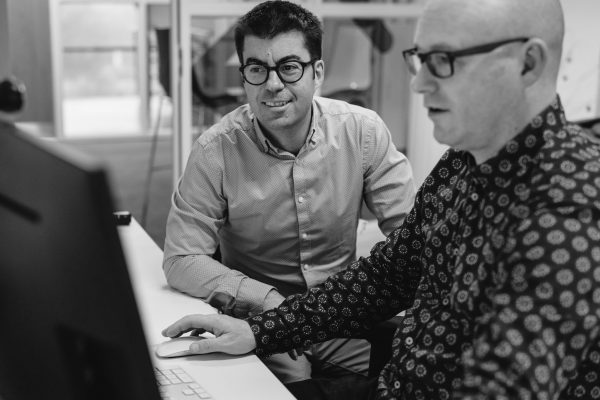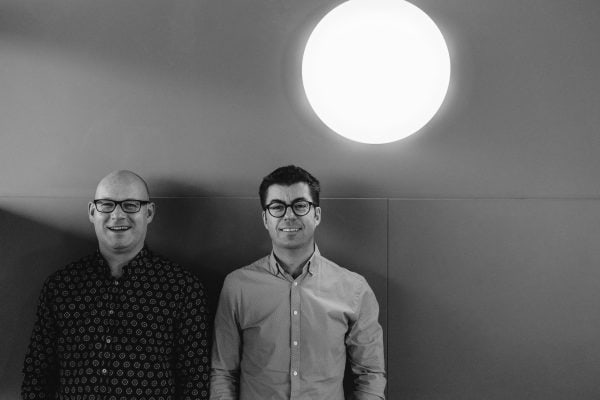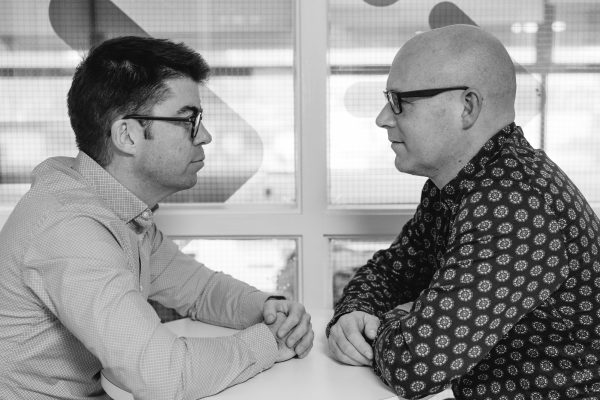Agile development is all about intelligent, motivated people working together closely to solve problems in innovative ways. But with everyone working from home during COVID-19 lockdowns, collaboration is proving difficult for many organisations.
Headforwards founders Toby Parkins and Craig Girvan recently had a socially-distanced chat about how we’ve all adapted to working from home, and what they think our operations might look like in a post-pandemic world.
How has working from home affected the agile development approach?
CRAIG: The shift to working from home has forced us to change one of our most fundamental practices: co-locating teams. For us, the best development work comes from a whole team working closely together – and that’s definitely more difficult when you’re all separated. But we’ve been very fortunate; there was no downtime at all, and our people are working really well from home.
TOBY: Innovation happens when we have the opportunity to bounce off each other – those ‘water cooler’ moments where you can have a casual chat about work that sparks a new idea. We’re all having to work very hard to try and replicate that in a digital way.
Have you learned anything from other organisations?
CRAIG: It’s interesting to look at how other people are approaching this. A lot of our model is based on trying to improve on what other organisations are doing, but there are plenty that are doing good work that we can learn from, too. Take Google, for example. They’ve closed all their offices, and that’s that. We’ve done something similar – we’ve set a date, and our office will stay shut until at least that time. That means no one needs to worry about readjusting to the office without warning.
TOBY: Companies have made a lot of bold, definitive statements about the future of work, and many are embracing remote working. Some companies have even ended their office leases – but are they considering everyone’s circumstances? Not everyone can work from home forever.
What surprised you about the effects of lockdown?
TOBY: One of the most interesting things I’ve observed is everyone talking about lockdown from their own individual perspective. Some people love it; others are really struggling. You have to be mindful that one person might be working from their bedroom in a shared house, while someone else might have a separate office and more room to move around.
That makes a huge difference. Teams work best when everyone can rally around an individual that has a challenge – in lockdown, some people are going to need much more support than others.
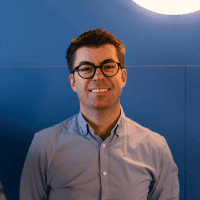
By having discussions with the people who are working with the everyday reality of remote collaboration, or a hybrid model, you can make more informed decisions.
Does lockdown change team dynamics?
CRAIG: Over time, teams build relationships and trust with each other – we refer to that as ‘team credit’. We were worried that we’d spend it too quickly when we went remote, but with all the digital channels available, our teams still work together so well. I think it’s still a valid concern, though. The longer we work apart, the harder it’s going to be to maintain those close-knit working relationships, so we need to find new ways to build it back up.
TOBY: Team-building exercises, away days, socials… all those things were created to try and boost team credit. But you can’t do those in lockdown, and virtual socialising doesn’t work in quite the same way.
You don’t bump into each other in the corridor, chat at lunchtime, or do mobbing and workshops together – you have to seek out that dynamic team-building activity.
What’s the next step for Headforwards?
TOBY: We’ve been thinking about this a lot, and the more we think about it the more we realise that it’s a very complex question. There are a lot of factors, and no easy answers.
We’re learning that meeting face-to-face is most important when you’re planning or doing creative work. There’s an opportunity to create lots of different types of working spaces; rooms with a lot of whiteboards, for example, or cameras and screens for mixed teams where some people are still remote.
How are you making decisions about that next step?
TOBY: We have experienced facilitators working with each team, so they can share their thoughts both collectively and as individuals. We want to know how they view work in the future – and we want them to propose their own solutions.
We’re taking the very classical agile approach of plan, do, review. They’ll try new working approaches for a few months, reflect on whether it’s effective, and share their findings with the rest of the organisation. With more than 20 teams, that’s potentially a lot of different ideas.
A single policy – one that dictates how everyone should be working – can just lead to you losing good people.
Why is it important to give teams control over how – and where – they work?
TOBY: There’s a lot of value and power in letting people try things out and keep control over how they operate. And we can assess its success based on what it looks like from a productivity perspective, from a software quality perspective, and from an interpersonal perspective. The members of a team are far more likely to create something effective for them than a decision-maker four or five levels above them in the organisation.
CRAIG: You don’t want your team to feel like they’re being forced into situations and working models that aren’t right for them.
Do you have any advice for other leaders?
CRAIG: One of our rules is ‘don’t tell people what to do’. We give them the goals, and any parameters or constraints, and then we let them find the best way to get there. Frame the problem for them and then let them solve it.
TOBY: Lots of leaders are used to making those top-down decisions, but we think that’s far riskier at the moment. A single policy – one that dictates how everyone should be working – can just lead to you losing good people.
CRAIG: If you’re in a hierarchical organisation, and you’re used to being the person that makes decisions unilaterally, I’d recommend getting closer to your teams. I try to follow Genchi Genbutsu, one of the Toyota Production System’s principles – it’s also known as ‘go and see’. By having discussions with the people who are working with the everyday reality of remote collaboration, or a hybrid model, you can make more informed decisions.
Is remote working the future for Headforwards?
CRAIG: It’s always been part of our values to encourage teams to decide how, when, and where they work. This was true pre-COVID, it’s true now, and it’ll be true post-COVID. We listen to what our teams want and do what we can to make that happen.
TOBY: I wouldn’t say I’m completely converted to homeworking. It’s an artificial situation; working in lockdown is different to choosing to work from home because you think it’s going to be more productive.
I think we’re going to have some really interesting post-pandemic phases where we try different models of working. People will be able to make far more objective decisions about whether homeworking will be right for their team without the pressure. A pandemic isn’t the time to find answers to such complicated questions.
CRAIG: Now it’s about being empiricists, being scientists, and seeing what lessons we can take from the experience. It’s a forced experiment, but there’s always something we can learn.
